人教版高中英语必修二第2讲:Unit1 Cultural relics-语法篇(学生版)
人教版高中英语必修二Unit 1 Cultural relics的重要知识点

人教版高中英语必修二Unit 1 Cultural relics的重要知识点1. 词汇与短语:- look into:调查- consider:认为,考虑- in return:作为报答- take apart:拆开- make into:制成- remove:移走- belong to:属于(无进行时和被动语态)- rather than:而不是- remain:保持不变- be popular among/with:在……中流行- survive:幸存下来,后面可以直接加表示“灾难”的名词,如war, flood, fire, accident, earthquake, shipwreck等。
翻译时,可以先将survive后的名词译成“经过……后”,然后再译“幸存下来”。
2. 语法与句型:-注意理解并掌握属于(belong to)这个短语的无进行时和被动语态的特点。
-学习如何在句子中正确使用survive这个单词,并理解其与其他表示“幸存”的单词或短语的区别。
3. 话题与语境:-本单元主题为“文化遗迹”,涉及到文化遗迹的定义、重要性、保护方法等相关话题。
在学习过程中,可以通过阅读相关的文章、观看纪录片等方式,加深对文化遗迹的理解。
-学习如何在不同的语境中运用所学的词汇和短语,如讨论文化遗迹的保护、描述文化遗迹的特点等。
4. 写作技巧:-学习如何撰写关于文化遗迹的文章,包括介绍文化遗迹的历史背景、文化价值、保护现状等。
-掌握在文章中正确运用所学的词汇和短语,使文章表达清晰、准确。
5. 听力与口语:-通过听力材料了解不同地区的文化遗迹及其背后的故事。
-练习用英语讨论文化遗迹相关的话题,提高口语表达能力。
通过掌握以上知识点,学生可以更好地理解和运用英语来讨论文化遗迹这一话题,提高英语综合运用能力。
高中英语人教版必修二知识点总结Unit 1 Cultural Relics
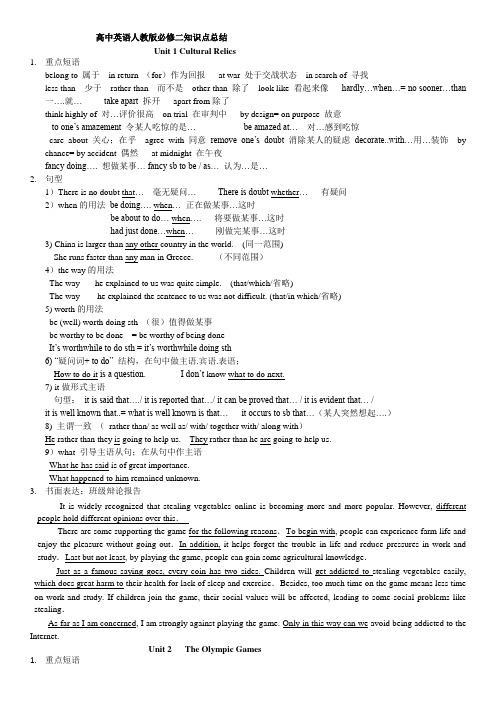
高中英语人教版必修二知识点总结Unit 1 Cultural Relics1.重点短语belong to 属于in return (for)作为回报at war 处于交战状态in search of 寻找less than 少于rather than 而不是other than 除了look like 看起来像hardly…when…= no sooner…than 一….就… take apart 拆开apart from除了think highly of 对…评价很高on trial 在审判中by design= on purpose 故意to one’s amazement 令某人吃惊的是… be amazed at… 对…感到吃惊care about 关心;在乎agree with 同意remove one’s doubt 消除某人的疑虑decorate..with…用…装饰by chance= by accident 偶然at midnight 在午夜fancy doing…. 想做某事… fancy sb to be / as… 认为…是…2.句型1)There is no doubt that… 毫无疑问… There is doubt whether… 有疑问2)when的用法be doing…. when… 正在做某事…这时be about to do… when…. 将要做某事…这时had just done…when… 刚做完某事…这时3) China is larger than any other country in the world. (同一范围)She runs faster than any man in Greece. (不同范围)4)the way的用法The way___ he explained to us was quite simple. (that/which/省略)The way ___ he explained the sentence to us was not difficult. (that/in which/省略)5) worth的用法be (well) worth doing sth (很)值得做某事be worthy to be done = be worthy of being doneIt’s worthwhile to do sth = it’s worthwhile doing sth6) “疑问词+ to do” 结构,在句中做主语.宾语.表语;How to do it is a question. I don’t know what to do next.7) it做形式主语句型:it is said that…./ it is reported that…/ it can be proved that… / it is evident that… /it is well known that..= what is well known is that… it occurs to sb that…(某人突然想起….)8) 主谓一致(rather than/ as well as/ with/ together with/ along with)He rather than they is going to help us. They rather than he are going to help us.9)what 引导主语从句;在从句中作主语What he has said is of great importance.What happened to him remained unknown.3.书面表达:班级辩论报告It is widely recognized that stealing vegetables online is becoming more and more popular. However, different people hold different opinions over this.There are some supporting the game for the following reasons.To begin with, people can experience farm life and enjoy the pleasure without going out.In addition, it helps forget the trouble in life and reduce pressures in work and study.Last but not least, by playing the game, people can gain some agricultural knowledge.Just as a famous saying goes, every coin has two sides. Children will get addicted to stealing vegetables easily, which does great harm to their health for lack of sleep and exercise.Besides, too much time on the game means less time on work and study. If children join the game, their social values will be affected, leading to some social problems like stealing.As far as I am concerned, I am strongly against playing the game. Only in this way can we avoid being addicted to the Internet.Unit 2 The Olympic Games1.重点短语stand for 代表;象征stand out 显眼,突出every four years = every fourth year 每四年take part in 参加play a part/role in… 在…中起作用as a matter of fact = in fact 事实上admit doing/ having done/ that-clause 承认做了某事be admitted to/into 被允许进入/录取compete with/against sb for sth 为某物和某人竞争volunteer to do sth 自愿做某事take place 发生take the place of = replace 代替in place of = instead of 代替in charge of 负责.. in the charge of .. 由…负责charge sb with sth = accuse sb of sth 因.. 指控某人free of charge 免费be allowed to do 被允许做make a bargain with sb. 和某人达成协议bargain with sb over/ about/ for sth 就某事与某人讨价还价one after another 一个接一个fall down 跌倒hear of 听说change one’s mind改变主意pick up 捡起/ 用车接/ 学会2. 重点知识点1)deserve的用法(用法相似的动词:need/want/require doing= need/want/require to be done 需要….)deserve to do sth 应该做/值得做deserve doing = deserve to be done 值得… (doing 表被动意义) Your suggestion deserves to be considered = deserves considering.2) take part in : 参加有组织的,重大的活动join in 参加正在进行的活动join: 参加团体,党派和组织(join the army; join the party)attend: 出席,参加,后跟meeting,wedding,class, course等3) nor/ neither + 助动词/ be /情态动词+ 主语:表示“…也不这样”I have never been abroad, and neither/ nor has he.If you don’t go to the party, nor will I.He is a diligent student, and she doesn’t like music. So it is with me./ It is the same with me.4) as …as… 的用法He is as tall as his brother.as + adj. + a/an + n + as… / as + many/much + n. + as…像…那样;正如He is as good a teacher as my brother.Unit 3 Computers1.重点短语have something/nothing in common 有/ 无共同之处compare ..w ith….比较according to 根据from…on.. 从….起go by 经过as well as 和as well 也as a result 结果是as a result of 由于… result in 导致result from 起因于the way to do/ of doing sth 做某事的方法in a way 在某种程度上in the way 挡道in no way 绝不with the help of sb = with sb’s help 在某人的帮助下deal with 处理achieve/ reach the goal 实现目标apply for 申请apply to 应用于watch over 看守;监视be crazy about 对..着迷a solution to…解决办法after all 毕竟consist of 由….组成come true 实现make good use of 好好利用give away 泄露,捐赠can’t help doing sth 情不自禁做某事as time goes by = with time going by 随着时间的流逝2.重点知识点1)主语+ be + adj + to do The question is easy to answer.3). 状语从句的省略在when, while, if, unless, though, once等引导的状语从句中从句的主语和主句的主语一致, 且从句中的谓语含有be动词时, 为了使句子简洁, 可省略从句中的主语和be动词。
人教版必修二第2讲:Unit1 Cultural relics-语法篇(学生版)
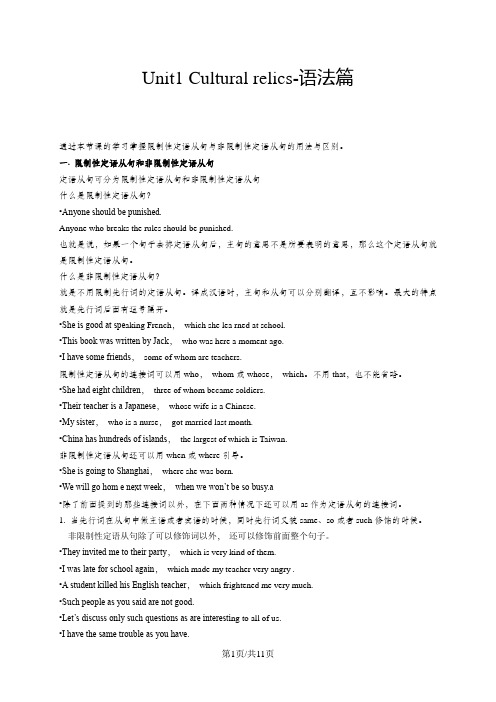
Unit1 Cultural relics-语法篇____________________________________________________________________________________________________________________________________________________________________通过本节课的学习掌握限制性定语从句与非限制性定语从句的用法与区别。
一.限制性定语从句和非限制性定语从句定语从句可分为限制性定语从句和非限制性定语从句什么是限制性定语从句?•Anyone should be punished.Anyone who breaks the rules should be punished.也就是说,如果一个句子去掉定语从句后,主句的意思不是所要表明的意思,那么这个定语从句就是限制性定语从句。
什么是非限制性定语从句?就是不用限制先行词的定语从句。
译成汉语时,主句和从句可以分别翻译,互不影响。
最大的特点就是先行词后面有逗号隔开。
•She is good at spe aking French,which she lea rned at school.•This book was written by Jack,who was here a moment ago.•I have some friends,some of whom are teachers.限制性定语从句的连接词可以用who,whom或whose,which。
不用that,也不能省略。
•She had eight children,three of whom became soldiers.•Their teacher is a Japanese,whose wife is a Chinese.•My sister,who is a nurse,got married last month.•China has hundreds of islands,the largest of which is Taiwan.非限制性定语从句还可以用when或where引导。
Unit1 Cultural-relics知识与要点-新人教版必修2
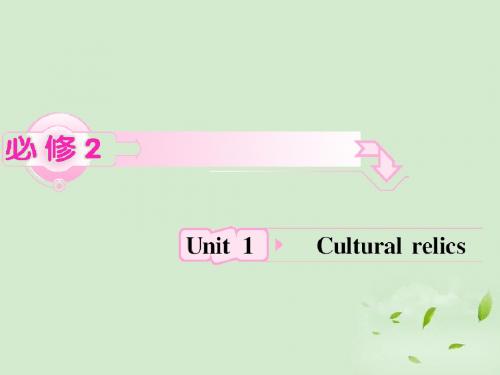
她觉得好像听到身后有脚步声。
Did anything take your fancy? 你看中了什么吗?
温馨提示 fancy用作动词,有时用于祈使句,表示惊奇、不相信、 震惊等,后加名词、代词作宾语,如Fancy meeting you here! 想不到在这儿遇见你!
【链接训练】 He usually appears to be honest.Who can fancy ________ such a thing? A.his do C.his to do B.his doing D.doing
by
5.The broken ship s ank to the bottom of the
6.Rose was doubtful (怀疑) about the whole idea.
7.We have found further scientific evidence (证据) for this theory. 8.You can leave a message with reception (接
有许多古怪的习俗是从早年流传下来的。
归纳拓展 survivor n. 幸存者 survival n.[U] 幸存,存活;[C]过去时代留存下来的人、 物、风俗、信仰等;遗迹;遗风;旧思想 The Poland presidential plane crashed in an area of
dense jungle.There were n林茂密的地区。无人生还。
【链接训练】 ①The firefighter helped the old man ____ the big fire.
A.survive
C.survive in 【解析】 【答案】
人教版高中英语新课标必修二 Unit1 Cultural relics 知识点详解整理

英语必修二Unit1 Cultural relics拓展词汇1.survive v.1)vi.继续生存或存在2)vt. (经历某遭遇后)幸存;幸免于;(从困境等中)挺过来;艰难度过3)vt.比……长寿;比……活得长【词汇变形】survival n.幸存in the/one’s search for 寻找,搜寻make a search for (去)找,搜查search for 搜寻search…for为了找……而搜查……3.could never have imagined 绝不可能想到could have done 过去可能做过;本可以……;本来能够……couldn’t have done 过去不可能做过……表推测:may/might have done 过去可能做过must have done 过去一定做过can’t/couldn’t have done 不可能做过表后悔、责备、遗憾等needn’t have done 过去本没有必要做(实际上做了)should/ought to have done 过去本该做(实际上未做)shouldn’t/oughtn’t to have done 过去本不该做(实际上做了)4.amazing adj.令人吃惊的;惊人的amaze v.使惊讶;使诧异amazed adj.惊奇的amazement n.惊奇;吃惊in amazement 吃惊地in one’s amazement/surprise 令人吃惊的是【词汇辨析】select 精心挑选elect 投票选举pick 挑剔和苛刻的选择choose 一般意义的选择6.design n.&vt.1)n.设计,图案,构思;计划by design =on purpose 故意地2)vt. 计划;设计;构思be designed to do sth. 目的是做be designed for 专为……而设计的be designed as 打算当做by chance/accident 偶然地7.fancy1)adj.奇异的,异样的;时髦的3)n.喜爱,想要take a fancy to 喜欢上;爱上1)属于某人;归某人所有2)是(俱乐部、组织等的)成员3)是(某族类或纲目的)一部分无被动,无进行做后置定语用belonging to1)作为(对……的)回报/报答=in reward for 2)作为回应【词汇辨析】in return 作为回报/报答in turn 相应地;转而,反之,反过来;依次;逐个,轮流12.the way 用作连词,相当于as13.at war 处于交战状态at+n.表示一种状态或持续的活动at peace 处于和平状态at rest 在休息at table 在吃饭at breakfast/lunch/supper 在吃早饭/中饭/晚饭at church 在做礼拜at sea 在航海at work 在上班at school在上学其他介词(in, on, under +n.)in trouble 处于困境中in danger 处于危险中under discussion 在讨论中under repair 在维修中on sale 上市,出售on holiday 在度假,在休假中on fire 着火,失火on duty 值班14.remove vt.remove sth. from 从……搬走某物remove sth. to 把某物搬到……remove sth. into/out 把某物搬入/搬出2)除掉;清除=get rid of3)脱下(衣服等)=take off; 摘下4)把……免职;开除remove sb. from 某人被免……职15.less than 少于,小于(某一数量或数目)16.同位语从句常在doubt,fact,news,idea,truth,hope,problem,information等词后。
高中英语Unit1 《Cultural relics》课件-语法 新人教版必修2

The house whose windows face south is very beautiful. 4) which 指物,作从句的主语或宾语。 This is the dictionary (which) I bought yesterday. 5) that 指人或物,作从句的主语或宾语,相当于which或 who,whom。 The man that/who is talking to her is a friend of hers. I don’t like the play (that/which) we watched on TV last night. 2. 引导定语从句的关系副词 1) when 作从句的时间状语。 Do you remember the week when we were in Shanghai? I won’t forget the day when I joined the League. 2) where 作从句的地点状语。 This is the factory where we worked 3 years ago. This is the place where Marx was born. 3) why 作从句的原因状语。 This is the reason why (=for which) she decided to go back to China.
非限制性定语从句和主句的关系并不什么密切,只是对先 行词作些附加说明,如果去掉,主句的意思还是比较明确的。
1.一般不用that引导 2.非限制性定语从句中,关系词不可省略。如: a) Bejing,which is the capital of China,has a very long history. b) Yesterday I met Li Ping ,who seemed to be very busy.
高中英语必修二Unit 1 Cultural relics 知识点

Unit 1 《Cultural relics》知识点【短语归纳】调查look into认为,考虑consider作为报答in return拆开take apart制成…make into移走remove属于belong to而不是rather than保持不变remain在…流行be popular among/ with活着,继续存在survive除了…之外还有besides毫无疑问have no doubt寻找in search of高度评价think highly of处于交战状态be at war证明prove在不到两天里in less than two days问题的答案the answer to the question同意某人的话agree with【重点句子】1.There is no doubt that…: 毫无疑问,…2.It takes somebody some time to do something. 做某事花某人多长时间3.This was a time when…在这个时期…4.It can be proved that…可以证明,…5.can't have done something不可能做过某事【单元知识点】1.survive作及物动词1)survive 表示“幸存”“(经过……)活下来”,它后面可以直接加war,flood,fire,accident,earthquake,shipwreck(船只失事)等表示“灾难”的名词。
翻译时,可以先把survive 后的名词译成“经过……后”,然后再译“幸存下来”。
但这种用法中,survive 没有被动语态。
survive sb. by + 时间段比某人活得长……2.in search of 寻找,找寻in the search of (×) in one's search for = in the search for (√)search sp.某地for sb./sth 搜查某地寻找某人某物in one's research of (×)3. could have done意思⑴:过去可能做过某事I can't imagine how he could have thought of doing such a thing。
人教版高中英语必修2高考Unit 1 Cultural relics要点梳理+重点突破 新
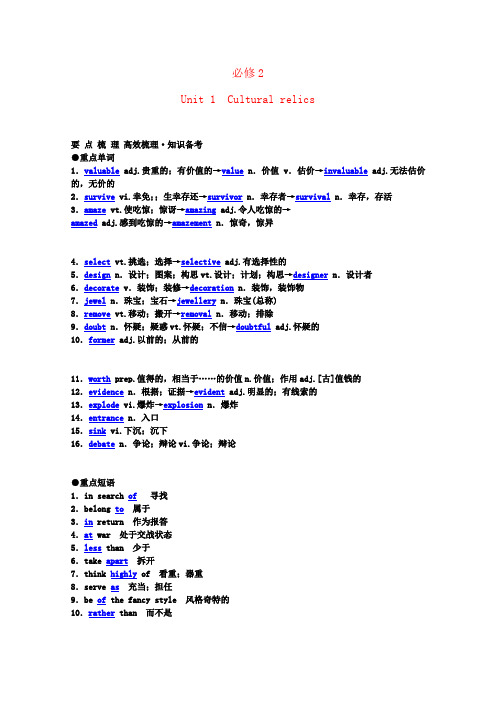
必修2Unit 1 Cultural relics要点梳理高效梳理·知识备考●重点单词1.valuable adj.贵重的;有价值的→value n.价值 v.估价→invaluable adj.无法估价的,无价的2.survive vi.幸免;;生幸存还→survivor n.幸存者→survival n.幸存,存活3.amaze vt.使吃惊;惊讶→amazing adj.令人吃惊的→amazed adj.感到吃惊的→amazement n.惊奇,惊异4.select vt.挑选;选择→selective adj.有选择性的5.design n.设计;图案;构思vt.设计;计划;构思→designer n.设计者6.decorate v.装饰;装修→decoration n.装饰,装饰物7.jewel n.珠宝;宝石→jewellery n.珠宝(总称)8.remove vt.移动;搬开→removal n.移动;排除9.doubt n.怀疑;疑惑vt.怀疑;不信→doubtful adj.怀疑的10.former adj.以前的;从前的11.worth prep.值得的,相当于……的价值n.价值;作用adj.[古]值钱的12.evidence n.根据;证据→evident adj.明显的;有线索的13.explode vi.爆炸→explosion n.爆炸14.entrance n.入口15.sink vi.下沉;沉下16.debate n.争论;辩论vi.争论;辩论●重点短语1.in search of寻找2.belong to属于3.in return 作为报答4.at war 处于交战状态5.less than 少于6.take apart拆开7.think highly of 看重;器重8.serve as充当;担任9.be of the fancy style 风格奇特的10.rather than 而不是●重点句型1.Frederick William I, the King of Prussia, could never have imagined that his greatest gift to the Russian people would have such an amazing history.普鲁士国王腓特烈·威廉一世永远想象不到,他赠给俄罗斯人民的最厚重的礼物会有这样一段令人惊讶的历史。
人教版高中英语必修2人教版必修二Unit 1Cultural relics语言点讲解
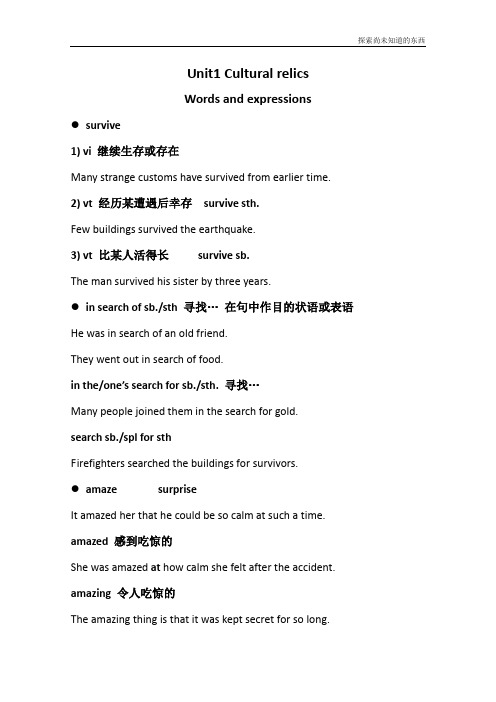
Unit1 Cultural relicsWords and expressions●survive1) vi 继续生存或存在Many strange customs have survived from earlier time. 2) vt 经历某遭遇后幸存survive sth.Few buildings survived the earthquake.3) vt 比某人活得长survive sb.The man survived his sister by three years.●in search of sb./sth 寻找…在句中作目的状语或表语He was in search of an old friend.They went out in search of food.in the/one’s search for sb./sth. 寻找…Many people joined them in the search for gold.search sb./spl for sthFirefighters searched the buildings for survivors.●amaze surpriseIt amazed her that he could be so calm at such a time. amazed 感到吃惊的She was amazed at how calm she felt after the accident. amazing 令人吃惊的The amazing thing is that it was kept secret for so long.designShe came to London in 1960 to study fashion design.The experiment is designed to test the new drug.This room is designed for the children.This is designed as a present for my daughter.We have designed building/ to build a park here.by design on purpose故意地by accident by chance 意外地Do you think the building was burnt down by accident or design?5. fancy vt 爱好,想象(语气较随意)imagineI fancy a swim.Don’t fancy that you can succeed without hard work..I can’t fancy his doing such a thing.My new roommate has a lot of fancy clothes. (adj. 别致的,装饰花哨的,奇特的)6. decorate decorate … with sthWe decorated the house with some pictures.译:墙上装饰有几幅画。
新人教版高中英语必修2Unit1 Cultural Relics--虚拟语气的用法

Unit 1 Cultural Relics虚拟语气的用法一.虚拟语气在非真实条件句中的用法: (使用虚拟语气的含条件句的复合句称为“真实条件句”)1.表示与现在事实相反的情况时, if从句的谓语用动词的过去式 (be动词的过去式多用were, 而不用was), 主句的谓语用should / would / could / might +动词原形 (should多用于第一人称, would多用于二三人称, could / might可用于所有人称)a. If I had more time, I should study computer better.b. If he were not so busy, she would attend the meeting this afternoon.c. If they didn’t take exercises every day, they wouldn’t be so healthy.2.表示与过去事实相反的情况时, if从句的谓语用had done形式, 主句的谓语用should / would / could / might + have done的形式a. If she had invited me yesterday, I should have gone to the party.b. I would have checked my paper again if I had had more time at yesterday’s exam.c. If you had taken the teacher’s advice, you wo uld not have failed in the exam.3.表示与将来事实相反的情况时, if从句的谓语形式是: ①.should +动词原形;②.were to do.主句的谓语的形式是: should / would / could / might +动词原形a. If she should invite me tomorrow, I would go to the party.b. If it were to rain tomorrow, our picnic would be put off.二.虚拟语气在非真实条件句中用法的几个变体:1.条件从句省略if: 在书面语中, 如果条件从句中的谓语中有were, had, should等词, 可将if省略, 而把were, had, should放在句首a. Were I you (=If I were you ), I would get up early very early.b. Had you arrived (=If you had arrived ) at the station ten minutes earlier yesterday, you could have caught the train.2.主从句时间不一致时, 主从句谓语动词的形式取决于要表示的具体时间a. You would speak English well if you had practised speaking it before.b. If she hadn’t trained so hard, she wouldn’t be able to run so fast now.4.假设的条件不以条件从句, 而以其他方式如介词短语、从句等表达出来, 这种句子称为含蓄条件句a. Without music, the world would be a dull place.b. We could have done better with more money.c. He would have given you more help, but he has been so busy.三.虚拟语气在as if / though从句中的用法:1.表示与现在事实相反或对相在情况有所怀疑, as if / though从句谓语用过去式a. He speaks English so well as if she had studied English in England.b. She looks as if she were ill.2.表示与过去事实相反的情况, as if / though从句谓语用过去完成式a. The machines operated as if it had been repaired.四.虚拟语气在主语从句中的用法:如果表示说话人的看法, 想法或意见, 在句型“It is / was + adj. + that 从句”中, 主语从句中可用虚拟语气. 主语从句中谓语动词用should do表示现在或将来情况, 用should have done表示过去情况a. It is necessary that you should clean the lab before you left.b. It is important that you should take the doctor’s advice.c. It was very strange that he should have left without say goodbye.五.虚拟语气在宾语从句中的用法:1.在wish的宾语从句中, 通常表示不可能实现或没有实现的愿望, 常用虚拟语气①.wish的宾语从句用过去式, 表示现在或将来没有实现或不可能实现的愿望a. I wish I knew the result of the match now.b. I wish it were spring here all the year round.c. I wishI could help you.②.wish的宾语从句用过去完成式, 表示过去没有实现或不可能实现的愿望a. We wish we had got the film tickets last night.b. I wish you I had met him yesterday.③.wish的宾语从句若用would, 则一般表示请求, 对现状不满或希望未来有所改变a. I wish the prices would come down.b. I wish you would help me.c. I wish he would be more careful.d. We wish you would spend the holiday with us.2.在动词suggest (建议), advise (建议), demand (要求), require (要求), order (命令), insist (坚持)后的宾语从句中, 谓语动词常用“( should )+动词原形”的虚拟语气形式a. I suggested that we should go there at once.b. I demand that he should answer me at once.c. The doctor insisted that the patient should stay in bed for two weeks.d. The officer ordered that the soldiers should stop playing.与名词suggestion建议 / advice 建议 / demand要求 / request要求 / order命令有关的从句(包括同位语从句和表语从句等)中的谓语也用“( should ) +动词原形”a. The black people made a strong demand that the government ( should ) take steps to change the unfair situation.b. Their demand is that the government should take steps to change the unfair situation.c. I was Bill’s suggestion that everyb ody should have a map.d. His suggestion was that everybody should have a map.六.虚拟语气用在句型: It is time that…(该做某事了)中: that从句中的谓语动词用过去式a. It is time we got up.七.虚拟语气用在if only引导的感叹句中: 表示“但愿…”, “要是…就好了”, 其中谓语形式与wish的宾语从句相同a. If only I were not ill now! ( =I wish I were not ill now.)b. If only he had taken the doctor’s advice. ( =I wish he had taken the doctor’s advice.)c. If only the rain would stop! ( =I wish the rain would stop.)八.虚拟语气用在would rather的that从句中: 表示现在或将来情况谓语动词用过去时形式, 表示过去情况动词用过去完成时形式a. I would rather he came next Saturday.b. I would rather you had seen the film yesterday.c. I would rather that he painted the house blue.。
高中英语 Unit1 Cultural relics教案 新人教版必修2-新人教版高一必修2英语教案

Unit 1 Cultural relics随堂练习1、Fill in the blanks with proper words〔the first letter is given〕The topic of this unit is cultural relics. A cultural relic is something that has survived for a long time, often a part of something that has remained when the rest of it has been destroyed; it tells people about the past.2、Read the passage again and choose the best answer for each blank.①The king of Prussia who gave the Amber Roomas a gift to Russia was B.A Frederick ⅠB Frederick William ⅠC Peter the GreatD Catherine Ⅱ文某某息:Frederick William Ⅰ, the king of Prussia, could never have imagined that his greatest gift to the Russian people would have such a strange history.〔Parag1〕②The king of Prussia gave the Amber Room to Russia because D.A he wanted to marry Catherine ⅡB he was kindC he needed better soldiersD he wanted to make friends文某某息:In 1716, Frederick William Ⅰ, gave it to Peter the Great, as a gift of friendship from the Prussian to the Russian people.〔Parag2〕③The Amber Room was stolen by B.A Russian soldiersB German soldiersC people in KonigsbergD people in St Petersburg文某某息:But some of the Nazis secretly stole the AmberRoom itself.④In 1941, the city of Konigsberg was in A.A GermanyB RussiaC SwedenD France文某某息:But some of the Nazis secretly stole the AmberRoom itself.⑤The Russians didn’t hide the Amber Room because C.A they were at warB they couldn’t find a placeC the German soldiers arrived too soonD no train could take it away文某某息:This was a time when the two countries were at war.3、Look at every statement. If you are “sure〞 it is true, mark “S〞 to the leftof it. If you are “not sure〞, mark “NS〞.〔NS〕1 The Amber Room was not easy to make.〔S〕 2 Catherine Ⅱdidn’t like everything about the Amber Room when she first saw it.〔S〕 3 The Amber Room was taken to Konigsberg and hidden there in 1941.〔NS〕4 The Russians didn’t care about the Amber Room.〔NS〕5 The Russians don’t think the Amber Room will ever be found.课堂笔记1、He insists it belongs to his family.他坚持说这是他家的。
人教版英语必修2-Unit1-cultural-relics-知识点详解
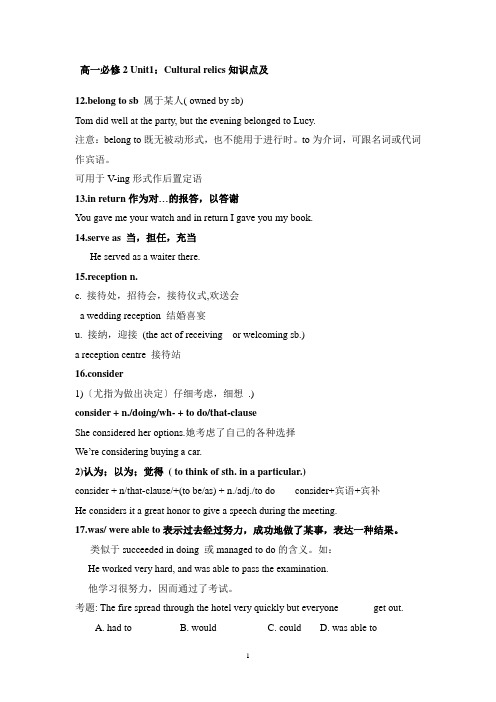
高一必修2 Unit1:Cultural relics知识点及12.belong to sb 属于某人( owned by sb)Tom did well at the party, but the evening belonged to Lucy.注意:belong to既无被动形式,也不能用于进行时。
to为介词,可跟名词或代词作宾语。
可用于V-ing形式作后置定语13.in return作为对…的报答,以答谢You gave me your watch and in return I gave you my book.14.serve as 当,担任,充当He served as a waiter there.15.reception n.c. 接待处,招待会,接待仪式,欢送会a wedding reception 结婚喜宴u. 接纳,迎接(the act of receiving or welcoming sb.)a reception centre 接待站16.consider1)〔尤指为做出决定〕仔细考虑,细想.)consider + n./doing/wh- + to do/that-clauseShe considered her options.她考虑了自己的各种选择We’re considering buying a car.2)认为;以为;觉得( to think of sth. in a particular.)consider + n/that-clause/+(to be/as) + n./adj./to do consider+宾语+宾补He considers it a great honor to give a speech during the meeting.17.was/ were able to 表示过去经过努力,成功地做了某事,表达一种结果。
类似于succeeded in doing 或managed to do的含义。
人教版高中英语新课标必修二Unit 1 Cultural relics 单词精讲及拓展+讲义

人教版高中英语必修二Unit1单词精讲及拓展1.Cultural adj.文化的⇨Culture n.文化⇨Culture 可做词根,构成新词,如:agriculture 农业●拓展Traditional Chinese culture 中国传统文化2.Relic n.遗址;=site/ruins,做“纪念物”意思时=souvenir3.Rare adj.罕见的⇨Rarely 很少,注意与nearly 几乎区分4.Valuable 值得的;贵重的=worthy5.Value 值得=worth➢拓展Devalue 低估反义词:overvalue高估6.Survive v.生存=live;幸免➢短语积累Survive sth./sb. 比…活得长✧Survival adj.幸免的✧Survivor 幸存者7.Select v.挑选8.Selective adj.挑剔的⇨形近词:elect 选举9.Honey 蜜;(口语)亲爱的●Honey moon 蜜月10.Fancy adj.奇特的=Strange作名词有“幻想”的意思➢相关短语Take one’s fancy 讨某人的喜欢;吸引某人✧Fanciful adj.有幻想力的✧Fancied 虚构的11.Style 风格✧Stylish 时尚的=fashionable12.Decorate v.装饰;美化=dress up✧Decoration 装修●Decorate with… 用…装饰13.Jewel 珠宝✧Jewelery 珠宝(总称)14.Belong v.属于注意*该词没有被动语态(没有被属于,本身已经含有被动意味)15.Reception 接待;也有“前台”的意思16.At war 处于交战状态➢相关拓展✧Battlefield 战场✧Battle with 和某人争论17.Wooden 木质的●Wood 木头;也有树林的意思●注意与woolen 羊毛区别18.Doubt n.怀疑➢Doubtful 充满怀疑的=Untrust19.Local 当地的=native●Location 本地20.Apart 分别➢Departure 离别21.Think highly of =look upon 看得起;高度重视。
人教版高中英语必修二第2讲:Unit1 Cultural relics-语法篇(教师版)
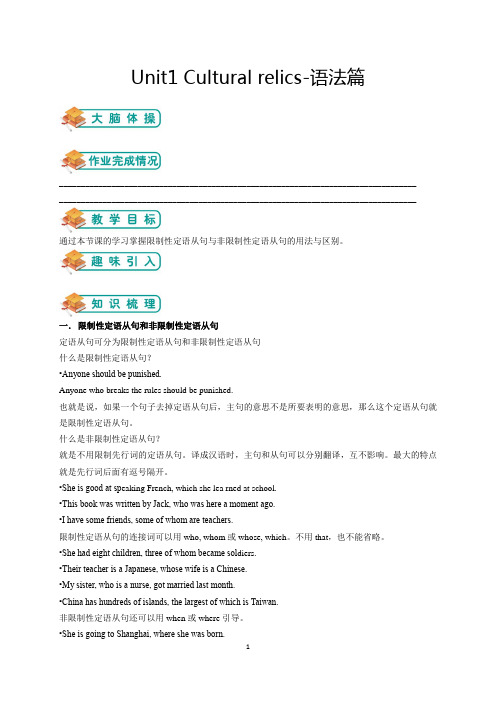
Unit1 Cultural relics-语法篇____________________________________________________________________________________________________________________________________________________________________通过本节课的学习掌握限制性定语从句与非限制性定语从句的用法与区别。
一.限制性定语从句和非限制性定语从句定语从句可分为限制性定语从句和非限制性定语从句什么是限制性定语从句?•Anyone should be punished.Anyone who breaks the rules should be punished.也就是说,如果一个句子去掉定语从句后,主句的意思不是所要表明的意思,那么这个定语从句就是限制性定语从句。
什么是非限制性定语从句?就是不用限制先行词的定语从句。
译成汉语时,主句和从句可以分别翻译,互不影响。
最大的特点就是先行词后面有逗号隔开。
•She is good at sp eaking French, which she lea rned at school.•This book was written by Jack, who was here a moment ago.•I have some friends, some of whom are teachers.限制性定语从句的连接词可以用who, whom或whose, which。
不用that,也不能省略。
•She had eight children, three of whom became sol diers.•Their teacher is a Japanese, whose wife is a Chinese.•My sister, who is a nurse, got married last month.•China has hundreds of islands, the largest of which is Taiwan.非限制性定语从句还可以用when或where引导。
- 1、下载文档前请自行甄别文档内容的完整性,平台不提供额外的编辑、内容补充、找答案等附加服务。
- 2、"仅部分预览"的文档,不可在线预览部分如存在完整性等问题,可反馈申请退款(可完整预览的文档不适用该条件!)。
- 3、如文档侵犯您的权益,请联系客服反馈,我们会尽快为您处理(人工客服工作时间:9:00-18:30)。
Unit1 Cultural relics-语法篇____________________________________________________________________________________________________________________________________________________________________通过本节课的学习掌握限制性定语从句与非限制性定语从句的用法与区别。
一.限制性定语从句和非限制性定语从句定语从句可分为限制性定语从句和非限制性定语从句什么是限制性定语从句?•Anyone should be punished.Anyone who breaks the rules should be punished.也就是说,如果一个句子去掉定语从句后,主句的意思不是所要表明的意思,那么这个定语从句就是限制性定语从句。
什么是非限制性定语从句?就是不用限制先行词的定语从句。
译成汉语时,主句和从句可以分别翻译,互不影响。
最大的特点就是先行词后面有逗隔开。
•She is good at spe aking French, which she lea rned at school.•This book was written by Jack, who was here a moment ago.•I have some friends, some of whom are teachers.限制性定语从句的连接词可以用who, whom或whose, which。
不用that,也不能省略。
•She had eight children, three of whom became sold iers.•Their teacher is a Japanese, whose wife is a Chinese.•My sister, who is a nurse, got married last month.•China has hundreds of islands, the largest of which is Taiwan.非限制性定语从句还可以用when或where引导。
•She is going to Shanghai, where she was born.•We will go hom e next week, when we won’t be so busy.a•除了前面提到的那些连接词以外,在下面两种情况下还可以用as作为定语从句的连接词。
1. 当先行词在从句中做主语或者宾语的时候,同时先行词又被same、so或者such修饰的时候。
非限制性定语从句除了可以修饰词以外, 还可以修饰前面整个句子。
•They invited me to their party, which is very kind of them.•I was lat e for school again, which made my teacher very angry .•A student killed his English teacher, which frightened me very much.•Such people as you said are not good.•Let’s discuss only such questions as are interesting to all of us.•I have the same tro uble as you have.•I feel just the same as you do.•He is so good a teacher as I like very much.•Those are so difficult the questions as he asked.2. 在非限定性定语从句中,as和which可代整个主句,相当于and this或and that。
as一般放在句首,which在句中。
•As we know, smoking is harmful to one's health.•Smoking is harmful to one’s health, which is known to all.二.限制性定语从句和非限制性定语从句的区别:所谓限制性定语从句,是指定语从句部分对先行词起限制、修饰的作用,关系代词有that, which, whom, who, whose以及关系副词when, where, why等,没有逗把从句与先行词分开。
限制性定语从句是先行词不可缺少的部分,去掉它主句意思往往不明确。
Do you know the professor who is speaking at the meeting?你认识那个正在会上讲话的教授吗?Where is the book which I bought this morning?我今天上午买的书在哪儿呢?此外,还有一类非限制性定语从句,非限制性定语从句是先行词的附加说明,去掉了也不会影响主句的意思,它与主句之间通常用逗分开。
用法其实与限制性定语从句极为相似,只是不能用that 引导。
This letter is from his parents, who are working in Tibet.这些信来自他的父母,他们在西藏工作。
English is an important subject, which every student should study well.英语是一门重要的科目,每个学生都应该学好。
This is our headmaster, who I think has something to tell you. 这是我们校长,我认为他有一些重要的事情要告诉你。
(校长只有一位)限定性:对先行词起修饰限制作用非限定性:对先行词起补充说明作用,先行词与定语从句有逗隔开.1. 从形式上看限制性定语从句与其先行词紧紧相连之间不用逗隔开;非限制性定语从句与先行词之间必须用逗隔开。
Mr. Smith,who came to see me yesterday,is one of my best friends.昨天来看我的史密斯先生是我的一位好朋友。
(非限制性定语从句)This is the teacher who has taught for 30 years.这就是那位有30年教龄的老师,你想见的那个人。
(限制性定语从句)2.从意义上讲限制性定语从句用来修饰先行词,具有限制作用,两者关系紧凑,如果将其去掉,会影响句子意思的完整性往往句意不明,有时甚至于引起费解、误解;而非限制性定语从句仅仅对先行词作补充性叙述或说明,不起限制作用两者关系不那么紧密,可以省略,省略后主句的意思仍然完整;Her sister who teaches us English will go abroad next year.她教我们英语的姐姐明年将出国。
(限制性定语从句,意思是她可能还有别的姐姐。
)Her sister, who teaches us English, will go abroad next year.她的姐姐教我们英语,明年将出国。
(非限制性定语从句,对先行词her sister起到补充说明的作用,言外之意:她只有一个姐姐。
)The old man has a son, who is in the army.那位老人有一个儿子,他在部队工作。
(非限定性定语从句是对son进行补充、说明。
“这位老人只有一个儿子”)The old man has a son who is in the army.“那位老人有一个在部队工作的儿子。
”限定性定语从句就要对先行词son进行限定、修饰。
(“这位老人有一个儿子在部队工作”,也就是说可能老人还有其他的儿子在干别的工作。
3. 从翻译方法来看一般来说,限制性定语从句多半译成汉语的前置定语,修饰其后的先行词,非限制性定语从句则往往译成后置的并列从句。
This is the house which we bought last year. 这是我们去年买的那幢房子。
(限制性)The house, which we bought last month, is very nice.这幢房子很漂亮,是我们上个月买的。
(非限制性)The teachers who are kind are popular with the students.态度和蔼的老师们受学生的欢迎。
(限制性)Mr. Wang, who is kind, is popular with the students.王老师深受学生的欢迎,他态度和蔼。
(非限制性)This notebook was left by Tom, who was here a moment ago.这个笔记本是汤姆留下的,刚才他还在这里。
4. 先行词不同限制性定语从句的先行词只能是一个名词或代词;非限制性定语从句的关系代词which既可以指代前面的先行词,也可以指代前面整句的含义。
指代前面整句的含义时,定语从句谓语动词要用第三人称单数。
This is the best novel that I have ever read.这是我看过的最好的小说。
(先行词是novel)The novel, which I read last night, is very interesting.这是我昨天晚上看过的小说,非常有意思。
(先行词为novel)The novel is very interesting, which makes me very glad.这部小说很有意思,这让我很高兴。
(先行词为“The novel is very interesting”)She heard the terrible noise, which brought her heart into her mouth. (which指代noise)He seems not to have grasped what I meant, which greatly upsets me.他似乎没领会我的意思,这使我心烦。
(Which指代句子“他似乎没领会我的意思”。
) 注意:当先行词是世界上独一无二的事物或人名、地名、国名、建筑物等专有名词时时,用非限制性定语从句;The moon, which is 384,400 kilometers away from the earth, goes around the earth.月球绕着地球转,它离地球384,000千米远Yesterday he left America, where he had stayed for two years.昨天他离开了美国,在那儿他待了两年。
